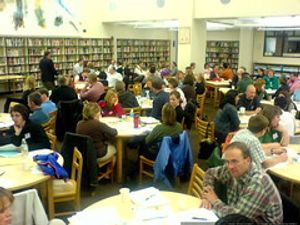engaging parents
published onNZ colleague Stephen Harlow recently tweeted a link to an interesting paper this week regarding parent involvement in schools - Beyond the Bake Sale: A Community-
Based Relational Approach to Parent Engagement in Schools from the Harvard Graduate School of Education.
I've experienced three different scenarios and from both inside and outside the system. My boys were lucky enough to spend at least some of their primary school years at a one teacher rural school (I hope they agree with that!). The school was in a close-knit community of people from very diverse backgrounds but who generally owned land and were committed to community development, and to each other. The boys teacher also lived in that community. Some parents had educational backgrounds (and interestingly quite a few went on to retrain in education-related fields in later years) but most were farming, parenting, studying or simply escaping from the big-smoke.
The school always welcomed the presence of parents and there were always parents around. Once a week we ran activity afternoons where parents could share their interests and skills (however obscure) with small groups of kids who chose their activity from the offerings for that term. The NSW governance structure 'School Councils' came into force at the time and we all did our bit in various roles on that, in addition to P&C fundraising activities. The level of involvement was up to each parent but there was certainly a sense that anyone was welcome.
Larger non-rural schools are a different case.
Even as an educator myself I generally stayed away. Partly this was because I was working and there was little opportunity to do much out of hours. School Councils and P&Cs were cliquey and there was a sense that they were run by a parent 'elite'. I guess I made a decision that I had done my bit at Afterlee and it was time for others to contribute. IN dealings with teachers, I made a point of not identifying myself as an educator and had some rather interesting interactions with teachers who certainly did their best to treat me as an imbecile, and at best in a patronising manner. I felt like a child entering the domain and was treated as one. There were exceptions of course.
So it's hardly surprising that many/most parents prefer to stay away. Given that many had negative schooling experience themselves, their child's attendance is a necessary evil to be done with.
While snippets of the paper resonated on the whole I have to say I found the paper pretty patronising. There was a sense of designing programs to deal with parent inadequacies, of telling parents what they should do. Of the case studies provided I thought the Logan Square Neighborhood Assoc's 'Literacy Ambassador program' totally pompous and uninviting.
Fault for non-engagement was placed on parental low-income .
Schools are a public service and teachers public servants. It is their practices that need to adapt. Services need to be offered that will entice the community in. Night classes designed and run by community members need to be encouraged using the infrastructure. If parents are hesitant to enter the school events and meetings should be taken outside school gates, in the parents comfort zone. Schools need to listen rather than preach. ALL types of contribution need to be respected and applauded - if parents wish to 'bake' celebrate that not denigrate it. Find out what the parents' strengths are and ask if they will share them. Identify the skills of parents and arrange for them to share/teach those skills and interests. Make an 'open door' policy and truly welcome parents to enter the classroom. I've seen the faces of young children (unfortunately lost in later years LOL) beam at having their parent present. Parents know when they are simply tolerated - they're not stupid. Just having parents inside the classroom is enough to begin with. Let them get a feel for what goes on before negotiating a task/role. Don't assume they want to listen to children read. In fact don't assume they are good readers themselves!
Following on from my last post, we need to rethink the education structures and design. We need movement and overlap between ages and focus. Increasingly we will need to break down the walls and consider online opportunities to enrich the lives of learners and to make full use of the rich pool of resources that is the local, and global, community.

cc licensed flickr photo shared by sean dreilinger